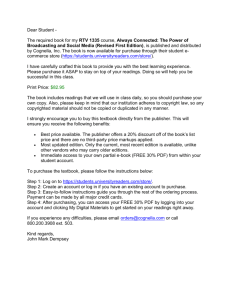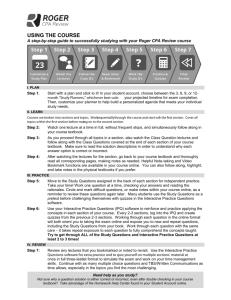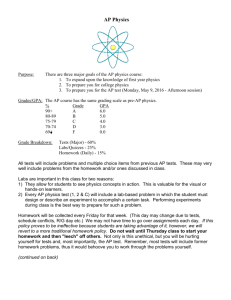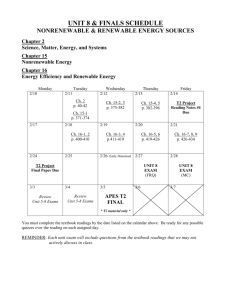Introductory Physics I with Laboratory Course Goals We will learn to
advertisement
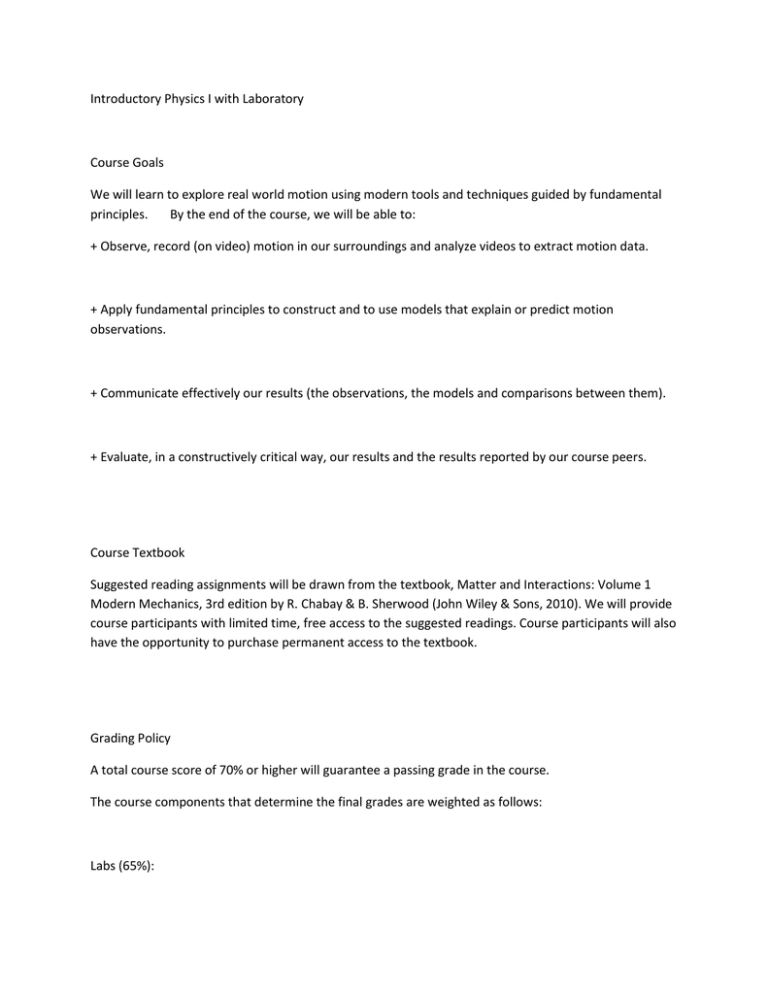
Introductory Physics I with Laboratory Course Goals We will learn to explore real world motion using modern tools and techniques guided by fundamental principles. By the end of the course, we will be able to: + Observe, record (on video) motion in our surroundings and analyze videos to extract motion data. + Apply fundamental principles to construct and to use models that explain or predict motion observations. + Communicate effectively our results (the observations, the models and comparisons between them). + Evaluate, in a constructively critical way, our results and the results reported by our course peers. Course Textbook Suggested reading assignments will be drawn from the textbook, Matter and Interactions: Volume 1 Modern Mechanics, 3rd edition by R. Chabay & B. Sherwood (John Wiley & Sons, 2010). We will provide course participants with limited time, free access to the suggested readings. Course participants will also have the opportunity to purchase permanent access to the textbook. Grading Policy A total course score of 70% or higher will guarantee a passing grade in the course. The course components that determine the final grades are weighted as follows: Labs (65%): Five labs will be assigned (approximately one every two weeks). The score on each lab will contribute equally toward the final grade. Each lab will typically (but not always) include these elements: motion observations by each participant recorded on video, extraction of motion data from videos, construction of motion models, including computer models. Unless otherwise specified, each participant must make and record their own motion observations and must construct their own models (including computer models). Each participant will report the main results of her/his lab in a 5-minute video. Each participant must compose and deliver his/her own lab report. Each participant will evaluate video lab reports submitted by peers in the course. The number of reports that each participant will evaluate will depend on the lab assignment. The median peer score on each lab report will be used to determine final grades. Homework (10%): Homework will be assigned and will be due weekly. Check the appropriate weekly tab (on the Navigation Bar to your left) for the specific assignments and corresponding due dates/times. Final Exam (25 %): The final will be administered during the last (11th) week of the course. Problems on the final will be in a multiple-choice format. The final must be taken closed book/closed notes. Guidelines We encourage active, timely participation in this course. It is important to stay on track by keeping up with the deadlines posted under the weekly tabs (on the Navigation Bar to your left). In particular: please be sure to: Watch all lecture videos and respond to all questions embedding in the lectures. Start your labs early and keep up with the submission deadlines. Complete all weekly homework assignments. Getting Help We encourage you to seek help if you need it. Please direct all help requests to the class forum, hosted on Piazza. The instructor and teaching assistants will frequently monitor the forum and will respond to questions as rapidly as possible. Participants are also encouraged to answer questions posted by fellow participants. Netiquette Please be positive, supportive and constructive in all comments and forum postings. Honor Code We believe that trust is an integral part of the learning process and that self-discipline is necessary in this pursuit. We also believe that any instance of dishonesty hurts the entire community. Participants are expected to act according to the highest ethical standards and avoid any academic misconduct that improperly distorts student grades or other student academic records. At the same time, the instructor and teaching assistants are expected to create an environment where honesty flourishes by making known what constitutes appropriate and inappropriate academic conduct. So, in this course, Participants must individually perform each lab by making and recording their own motion observations, constructing their own models (including computer models), composing and delivering their own lab reports, and evaluating assigned peer lab reports. Participants are encouraged to discuss and to share ideas about each lab, to seek feedback on preliminary drafts of lab reports. However, the submitted lab report and all work contained therein must be from the participant submitting the report. Submission of material that is wholly or substantially identical to that created or published by another person or person (plagiarism) is forbidden. Participants are encouraged to work together on homework assignments; however, obtaining complete solutions to homework problems from others or from the Internet is forbidden. The work submitted for the final exam must be solely due to each participant, without assistance from another person or information source (textbooks, notes, the Internet, etc.) If participants become aware of evidence of academic misconduct by others in the course, the participant should report the evidence to the instructor. Any participant who engages in academic misconduct will be removed from the course. Course Outline (Tentative) This outline provides a short overview of the course activities; details (activity specifics, including deadlines) are posted under the weekly tabs on the Navigation Bar to your left. Week 1: Introduction; Newton's 2nd Law Surveys and Concept Inventories Labs: Software Installation Lectures, Textbook Readings, Homework: + Math Background (1 Spatial Dimension) + Predicting the Future with Newton's 2nd Law Week 2: Newton's 2nd Law: Constant Velocity Motion Labs: Lab 1 (Constant Velocity): Assignment Lectures, Textbook Readings, Homework: + Lab Overview and Preparation + More Math Background (1 Spatial Dimension) Week 3: Newton's 2nd Law: Nonzero Net Force (1D) Labs: Lab 1 (Constant Velocity) : Submission & Peer Evaluation Lectures, Textbook Readings, Homework: + Nonzero Net Force: Predicting Motion in 1D + Math Background: Motion in more than 1D Week 4: Newton's 2nd Law: Nonzero Net Force in more than 1D Labs: Lab 2 (Free Fall): Assignment Lectures, Textbook Readings, Homework: + Nonzero Net Force: Predicting Motion in more than 1D + Modeling Forces Week 5: Newton's 2nd Law: Forces from Motion Labs: Lab 2 (Free Fall) : Submission & Peer Evaluation Lectures, Textbook Readings, Homework: + Determining Forces from Motion Observations Week 6: Energy Principle: Introduction Labs: Lab 3 (Black Holes) : Assignment Lectures, Textbook Readings, Homework: + Energy and Work + Potential Energy Week 7: Energy Principle: 1st Law of Thermodynamics Labs: Lab 3 (Black Holes) : Submission & Peer Evaluation Lectures, Textbook Readings, Homework: + Thermal Energy & Thermal Energy Transfer Week 8: Energy Principle: Complex Problems Labs: Lab 4 (Rope Physics) : Assignment Lectures, Textbook Readings, Homework: + Real vs Point Particle Models Week 9: Energy and Momentum Labs: Lab 4 (Rope Physics) : Submission & Peer Evaluation Lectures, Textbook Readings, Homework: + Conservation of Momentum + Collisions Week 10: Angular Momentum Labs: Lab 5 (Choose Your Own Adventure) : Assignment Lectures, Textbook Readings, Homework: + Rotational Motion & Angular Momentum Week 11: Course Wrapup Labs: Lab 5 (Choose Your Own Adventure) : Submission & Peer Evaluation Final Exam Surveys and Concept Inventories Course End Date: July 23,2014
